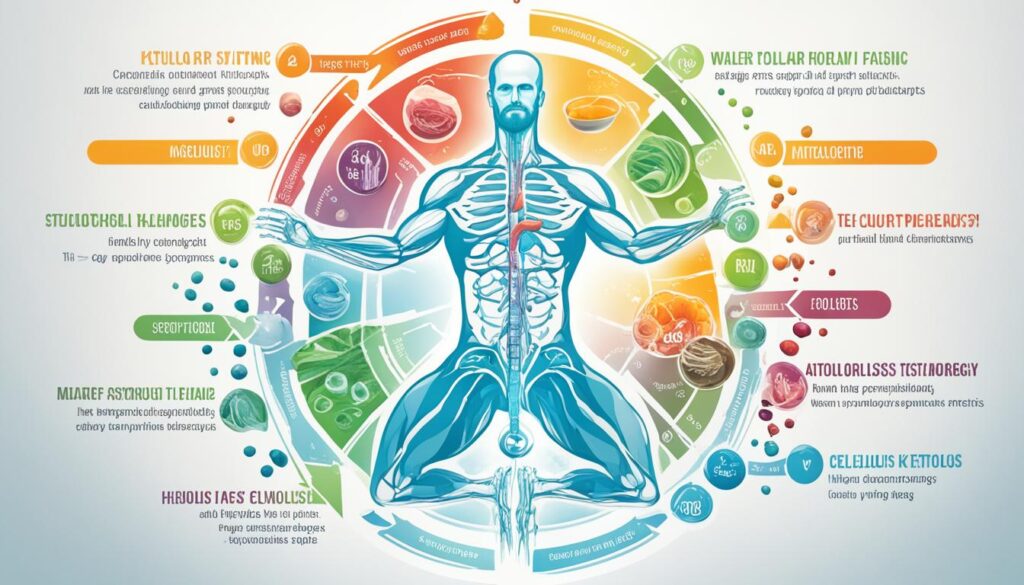Water fasting is getting popular as a quick way to lose weight and boost health. This involves not eating but only drinking water for 24-72 hours, the usual length of a water fast1. People do this for different reasons, like for their faith, to lose weight, to detox, or to see if it helps their health1.
Research shows that water fasting might reduce the risk of big diseases such as cancer, heart problems, and diabetes. It also helps with a process called autophagy, where cells clean up and get rid of old parts1. Fasting can make the body work better with insulin and leptin, which are important for metabolism. It can also lower levels of bad fats in the blood and protect the heart from harm caused by free radicals1.
But, it’s key to remember there aren’t many studies on how water fasting affects people. And, it can be risky for your health. You might lose water weight, carbs, and some muscle quickly, but that’s not all good. It could also lead to you being dehydrated or having low blood pressure when you stand up1. Water fasting is not a good idea if you have gout or an eating disorder. If you have health problems, you should be extra careful before trying this1.
Key Takeaways
- Water fasting typically lasts 24-72 hours and involves consuming only water
- Potential benefits include weight loss, reduced risk of chronic diseases, and improved metabolic function
- Water fasting may stimulate autophagy, a cellular renewal process
- Rapid weight loss during water fasting may include loss of water weight, carbs, and muscle mass
- Risks include dehydration, orthostatic hypotension, and worsening of certain health conditions
- Human studies on water fasting are limited, and it is not suitable for everyone
What is Water Fasting?
Water fasting means not eating or drinking anything but water for a set time. You avoid food, other drinks, and even simple seasonings or sweeteners. Most people do it for 24 to 72 hours at a time1. Doing it for longer without a doctor’s OK is not safe1.
Definition and Basics of Water Fasting
During a water fast, you only drink water. This is used for religious reasons, to lose weight, to cleanse the body, and some say it has health benefits1. Research suggests water fasting might lower risks of cancer, heart diseases, and diabetes1. But, there are dangers including losing muscle, dehydration, feeling dizzy if you stand up too quickly, and problems like gout and eating disorders getting worse1.
History and Cultural Significance of Fasting
People have been fasting for thousands of years across the globe. Many religions include fasting, like Muslims during Ramadan, and Christians, Jews, and Hindus at various times1.
Fasting wasn’t just for the soul, though. Long ago, Greek and Indian healers thought fasting could heal the body. They saw it as a way to purify and bring back balance.
These ancient ideas have sparked fresh interest today. People are looking at fasting for health benefits like losing weight, helping their metabolism, and possibly living longer. Water fasting is one way folks are trying to get healthier.
How a 72 Hour Water Fast Works
Doing a 72-hour water fast makes the body adjust to not having food. Usually, these fasts last 24 to 72 hours1. The body starts using its stored fats when it lacks food. This helps lose weight and makes insulin work better.

Physiological Changes During a Water Fast
During a fast, your body goes into ketosis. It burns fat for energy instead of using glucose. This can help you lose weight quickly. But, you need to drink enough water and be careful not to lose muscle1. Fasting can make insulin and leptin work better, which could help keep weight off1. Moreover, fasting might lower your chances of heart disease2.
Phases of Fasting: Ketosis and Autophagy
Starting ketosis also kicks off autophagy. It’s a process that fixes old cell parts. When you fast, your body might get a chance to heal itself1. This can lower inflammation and stress. Some studies suggest it might prevent diseases that come with inflammation3.
Your metabolism speeds up by 14% during a 3-day fast. This could boost your weight loss3. If you’re used to eating low-carb, high-fat foods, fasting for 72 hours might not be too hard. This is because your body is good at using its fat for energy3.
Fasting with only water might help your health. But, there’s not a lot of studies done on this. And, it does have risks. People with some health issues, like gout or diabetes, or those who are pregnant, shouldn’t try this without a doctor12.
Potential Health Benefits of a 72 Hour Water Fast
A 72 hour water fast could bring several health advantages. Studies show it might help with weight loss. It does this by putting your body in ketosis.4 In ketosis, you burn fat for energy instead of glucose.
In a small test, people lost over 13 pounds on average after 8 days of fasting. They also saw big drops in body fat.4
Improved Insulin Sensitivity and Blood Sugar Control
Long periods without eating, like water fasting, can lower your blood sugar and insulin. It’s great news for those with prediabetes or type 2 diabetes.4 Fasting can also make you more sensitive to hormones like insulin and leptin.1
One study found that after fasting on and off for three months, 90% of people with diabetes needed less medication. This included less insulin.2
Reduced Inflammation and Oxidative Stress
Water fasting might also help cut down on inflammation and oxidative stress. Both are big factors in many diseases.4 It could reduce your chances of getting diabetes, cancer, and heart disease.1
Occasional fasts might even protect your heart by lowering oxidative stress and starting ketosis.2
| Health Benefit | Mechanism |
|---|---|
| Weight Loss and Fat Burning | Induces ketosis, where the body burns stored fat for energy |
| Improved Insulin Sensitivity | Reduces fasting blood sugar and insulin levels, improves insulin resistance |
| Reduced Inflammation and Oxidative Stress | May lower risk factors for chronic diseases like diabetes, cancer, and heart disease |
Promoting Autophagy and Cellular Renewal
Water fasting can trigger autophagy. This process helps your body get rid of old cell parts. It encourages the growth of new cells.4 This might lower the risks of diseases, such as cancer and Alzheimer’s.1
Going without food for a while can clean out old cells. It makes way for new, healthier cells. This process can slow down aging and prevent some diseases.4 Fasting also helps your body fight off conditions like cancer and Alzheimer’s by promoting autophagy.2
Water fasting isn’t for everyone and it has its share of risks. Before trying it, talk to a doctor. Start with small steps. Cut down on eating slowly and drink more water. This is especially important if you’re used to eating a lot.4
Preparing for a 72 Hour Water Fast
Starting a 72 hour water fast is a big step. It’s crucial to get ready for it to be safe and successful. These fasts last from 24 to 72 hours. It’s not recommended to go longer without a doctor’s advice1. Make sure to prep your body and mind before diving in.
Consulting with a Healthcare Professional
The very first step is talking to your doctor. This is super important if you have health issues or take meds. They can guide you based on your health and meds, making sure fasting is okay for you.
Gradually Reducing Food Intake Before the Fast
Easing into the fast by cutting down on food slowly is best. Start eating less a few days before. Switch from three meals to two, then to just one. Focus on fruits, veggies, and lean meats. Less carbs makes your body burn more fat during the fast.
Add light exercise to your routine before fasting. It helps your body get ready to use its fat stores for energy. Being a little active during the fast is good too. Different exercises use different energy sources5.
Setting Intentions and Creating a Supportive Environment
Think about why you’re fasting and what you want from it. Whether it’s to get healthier, lose weight, or benefit from autophagy, knowing your goal is crucial. It keeps you motivated all through the fast.
Let your friends and family know about your fast. Ask for support. Plan activities that don’t involve eating. This might be reading, meditating, or light exercise. Having enough clean water is key. You should aim for two to three liters daily1. Adding more electrolytes to your diet helps with symptoms like dizziness and cramps5.
| Preparation Step | Key Considerations |
|---|---|
| Consult with a Healthcare Professional | Discuss medical conditions, medications, and personalized advice |
| Gradually Reduce Food Intake | Shift from three meals to two meals to one meal a day, focus on nutrient-dense foods |
| Engage in Low-Intensity Fasted Exercise | Help body ease into fat-burning mode and utilize stored fat for energy |
| Set Clear Intentions | Reflect on reasons for fasting and desired outcomes, stay motivated |
| Create a Supportive Environment | Inform family and friends, plan non-food activities, ensure access to clean water |
Proper preparation is key to making your 72 hour water fast a good experience. Listen to your body. Stay hydrated. Then, when you’re done, introduce foods slowly to avoid stomach issues5.
Tips for Successfully Completing a 72 Hour Water Fast
Starting a 72 hour water fast can be tough yet fulfilling. To make it through and gain the health benefits, remember a few key tips.
Hydration is vital during your fast. Drink at least 3 liters of water daily6. Adding pink Himalayan salt can help your body keep electrolytes in balance6.
Handling hunger is hard during a 72 hour fast. Keep your mind off food with activities that don’t involve eating. Mindfulness and light exercises like yoga can lessen hunger and keep you energized7.
Preparing mentally is essential. Have clear goals for your fast. Focus on the possible health benefits. These include better insulin function, less inflammation, and the start of autophagy after about 24 hours78.
| Fasting Duration | Physiological Changes |
|---|---|
| 12 hours | Start of ketosis |
| 18 hours | Fat burning |
| 24 hours | Autophagy begins |
| 48 hours | Growth hormone increase |
| 72 hours | Cell regeneration |
Not everyone should try a 72 hour water fast. If you have health issues or take medicines, always talk to a doctor first6.
With the right prep and mindset, plus focus on water and hunger, you can succeed in a 72 hour fast. You might enjoy clearer thinking, lower disease risks, and better cell growth6.
Breaking a 72 Hour Water Fast Safely
Completing a 72-hour water fast safely is important. You should break this fast slowly to avoid digestive issues. It’s key to tailor your approach based on your own body9. Start with nutrient-dense and easily digestible foods for your recovery and health.

Reintroducing Foods Gradually
Start by reintroducing foods slowly after a water fast to re-adjust your digestive system. Begin with small portions of foods like bone broth or cooked vegetables. This helps your body readjust to eating9. Choose foods that are light and easy to digest:
- Fruits: Watermelon, papaya, berries, and citrus fruits
- Vegetables: Leafy greens, cucumbers, and cooked vegetables like squash or sweet potatoes
- Light soups: Vegetable broth, bone broth, or miso soup
- Fermented foods: Yogurt, kefir, or sauerkraut to support gut health
Avoid foods that are heavy, greasy, or processed. It’s also important when you eat after fasting. Studies show that breaking a fast in the morning might be better for health than at night9.
Focusing on Nutrient-Dense, Easily Digestible Foods
Choose foods that are full of vitamins, minerals, and fiber to help your body recover. Avoid refined carbs. Instead, choose lean protein, healthy fats, and low GI carbohydrates to balance your blood sugar9. Here are some foods you can consider:
| Food Category | Examples | Benefits |
|---|---|---|
| Lean Proteins | Eggs, fish, chicken, tofu | Supports muscle recovery and satiety |
| Healthy Fats | Avocados, nuts, seeds, olive oil | Promotes nutrient absorption and satiety |
| Complex Carbohydrates | Sweet potatoes, quinoa, oats, legumes | Provides sustained energy and fiber |
| Fruits and Vegetables | Berries, leafy greens, citrus fruits, cruciferous vegetables | Rich in antioxidants, vitamins, and minerals |
Eat small, frequent meals and listen to your body. A walk after eating can help your body process food better, improving digestion9. Breaking a fast safely is crucial. It helps you keep the health benefits of fasting, like better insulin sensitivity and less inflammation1.
Potential Risks and Precautions for Water Fasting
Water fasting has health benefits but also risks. It’s not for everyone. Understanding these risks is crucial before trying it. This way, you can decide if it fits your health needs.
Who Should Not Attempt a 72 Hour Water Fast
It’s best not to do a 72 hour water fast alone. Special care is needed for certain groups before fasting. These include children, pregnant women, and those with eating disorders. Also, if you have certain health problems, consult a doctor before you fast10. They can help you find a safe fasting length. This ensures it benefits your health, not harms it.
Signs and Symptoms to Watch Out For During a Fast
While fasting, keep an eye on your health. Look out for signs like feeling tired, dizzy, or getting headaches. If you feel really bad, stop the fast and get help10.
- Tiredness and low energy levels
- Dizziness and weakness
- Headaches
- Nausea
Fasting can lead to being tired, dizzy, and weak. If you feel too sick, end the fast. Getting medical help is smart if you’re very confused or disoriented10.
Staying hydrated is key to reducing fasting risks. You should drink 2-3 liters of water daily while fasting. Plus, taking minerals also helps. Remember, food usually gives us 20-30% of our daily water. This means you can get dehydrated while fasting1.
Fasting can change hormones, burn fat, and cut stress. But, we need more studies on the effects on humans. Most research is on animals. So, more human research is needed to give clear advice1.
| Contraindications for Fasting | Potential Fasting Side Effects |
|---|---|
|
|
Summing up, water fasting can bring health benefits. But, it’s crucial to be cautious and know the risks. Always talk to a doctor. Stay alert to your body’s signals. Stop if you get very sick. Knowing the dangers and watching for side effects helps you decide if a 72 hour fast is for you.
Conclusion
A 72-hour water fast can help you lose weight and improve how your body handles insulin. It also lowers inflammation and helps with a process called autophagy1. Water fasting might lower your blood pressure, improve your bad cholesterol, and lessen inflammation1. But, be careful. Think about your general health, any medical issues, and your everyday life before trying a fast11. For pregnant women, people with type 1 diabetes, or anyone on meds that require food, water fasting can be dangerous11.
Before you start, know that hydrating, dealing with hunger, and finishing the fast correctly are key. After 2 days of water fasting in a hospital, some people felt tired, nauseous, or had headaches11. Reintroducing food too quickly might lead to refeeding syndrome, which is serious11. Most studies on water fasting’s benefits come from animals or very short human cases. So, we need more research to be sure1.
Though water fasting can boost health, it’s not for everyone. If you choose this route, do it smartly, maybe with a healthcare provider’s support. Another choice is intermittent fasting, like only eating within certain hours each day. This can be easier and still offer health benefits11. Recent studies show those who do intermittent fasting report more energy, improved digestion, reduced bloating, and weight loss11. Always think about what’s best for you and get advice from a healthcare expert before fasting.
Source Links
- https://www.healthline.com/nutrition/water-fasting
- https://www.health.com/water-fasting-7556171
- https://www.doctorkiltz.com/72-hour-fast/
- https://www.forbes.com/health/weight-loss/water-fasting/
- https://medium.com/change-your-mind/how-im-preparing-for-a-72-hour-fast-3fd4cdb5cb34
- https://www.fitfatherproject.com/72-hour-fast-fb/
- https://betterme.world/articles/72-hour-fast/
- https://humansexuality.medium.com/10-secrets-to-completing-a-72-hour-fast-fb5e58cce8c0
- https://www.nutrisense.io/blog/break-a-fast-without-messing-up-glucose
- https://www.medicalnewstoday.com/articles/319835
- https://zoe.com/learn/water-fasting




